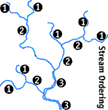 |
The image Wheeling
Creek stream map shows all of the permanently flowing streams in the Wheeling Creek
watershed. Trace the path of a drop of water as it flows down a gradient from headwaters
to mouth. How many stream orders must the water pass through to reach the Ohio River? View
the image watersheds to see a comparison of the drainage
area of third- and fourth-order streams in the Wheeling Creek watershed. Photo: Courtesy of Dr. Trevor Harris, WVU and
Dr. Ben Stout
|
 |
You can determine stream order from a map of a stream
network. A sample stream ordering diagram to the left is provided to assist you. Start by
identifying the smallest streams, those that have no permanently flowing tributaries.
First-order streams are perennial streams, which carry water all year. When two
first-order streams come together, they become a second-order stream. When two
second-order streams come together, they form a third-order stream. However, if a
first-order stream joins a second-order stream, it remains a second-order stream. It is
not until a second-order stream combines with another second-order stream that it becomes
a third-order stream. Print the Wheeling Creek stream map
and see if you can determine the stream order of Wheeling Creek where it enters the
eighth-order Ohio River. Photo:
Courtesy of Hope Sacco Childers
|
 |
A first-order stream in a forested area of the Wheeling
Creek watershed. Notice the narrow stream width and the closed forest canopy. This stream
is well-shaded during the months when leaves are on the trees. Photo: Courtesy of Kenneth E. Rastall
|
 |
A second-order stream in the headwaters of Wheeling Creek.
Photo: Courtesy of Kenneth E.
Rastall |
 |
A second-order stream joins a fourth-order stream. Does
the fourth-order stream double in size with the addition of a second-order stream? Photo: Courtesy of Pamela S. Rastall |
 |
A third-order stream. How does the stream's width and
forest canopy compare with those of the first-order stream and the sixth-order stream? Photo: Courtesy of Kenneth E. Rastall |
 |
Aerial view of a third-order stream entering a
fourth-order stream. Does stream order change when this tributary enters the larger
stream? Photo: Courtesy of Dr.
Ben Stout |
 |
Wheeling Creek nearing the Ohio River. How does this
stream differ from those above? Photo: Courtesy of Dr. Ben Stout |

